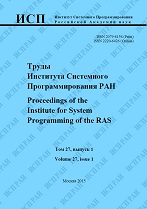|
This article is cited in 1 scientific paper (total in 1 paper)
A constraint library for specification of industrial data models
S. V. Morozovab, D. V. Ilyinb, V. A. Semenovcb, O. A. Tarlapanab
a Lomonosov Moscow State University
b Institute for System Programming of the Russian Academy of Sciences
c Moscow Institute of Physics and Technology
Abstract:
The paper is addressed to an analysis of object-oriented data models specified at EXPRESS language and widely used in industrial applications. These models play important role for achievement of software interoperability and system integration in accordance with STEP standard family (ISO 10303). The examples of such models are STEP application protocols for machinery construction, automobile industry, shipbuiling, electronics, electrical engineering, systems engineering, furniture production as well as IFC (ISO 16739) model for architecture, engineering and construction, CIS/2 model for manufacturing using constructional steel work, POSC Caesar (ISO 15296) model for oil and gas producing industry. The purpose of the performed analysis is to unify representation of data integrity constraints typically used in the models by means of identification of constraint patterns. The identified patterns are specified at EXPRESS language as an unified constraint library that can be applied both on refactoring of the existing models and on development of new ones. Utilizing the constraint library users can improve clearness of the specifications, to simplify their maintenance and evolution and, on the whole, to accelerate their development. Besides, CASE tools can be effectively applied to analyze the specifications in highly automatic way. Possibility to apply the library for verification of the data models is also discussed in the paper. Rules for resolving the appropriate constraints have been proposed for each pattern. The constraint library can be recommended to industrial consortiums and technical committees that are engaged in development and standardization of the data models.
Keywords:
object-oriented modeling, EXPRESS, STEP, IFC, CIS/2, constraint patterns, model verification.
Citation:
S. V. Morozov, D. V. Ilyin, V. A. Semenov, O. A. Tarlapan, “A constraint library for specification of industrial data models”, Proceedings of ISP RAS, 27:4 (2015), 69–110
Linking options:
https://www.mathnet.ru/eng/tisp165 https://www.mathnet.ru/eng/tisp/v27/i4/p69
|

|




 Contact us:
Contact us: Terms of Use
Terms of Use
 Registration to the website
Registration to the website Logotypes
Logotypes








 Citation in format
Citation in format 
